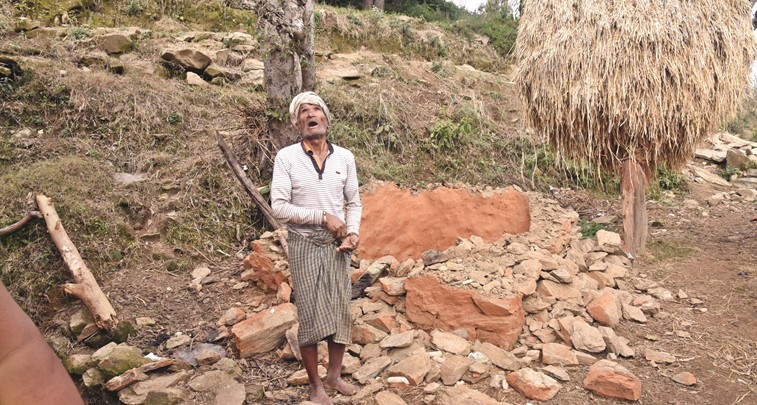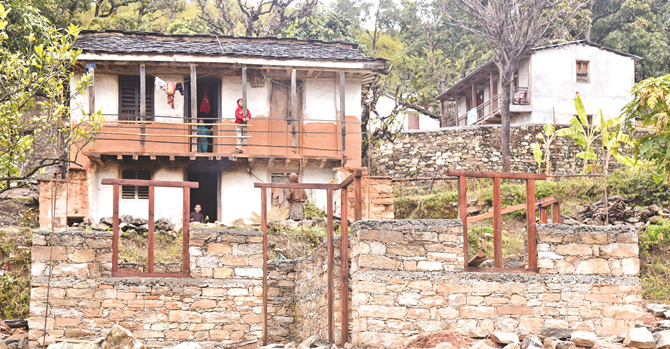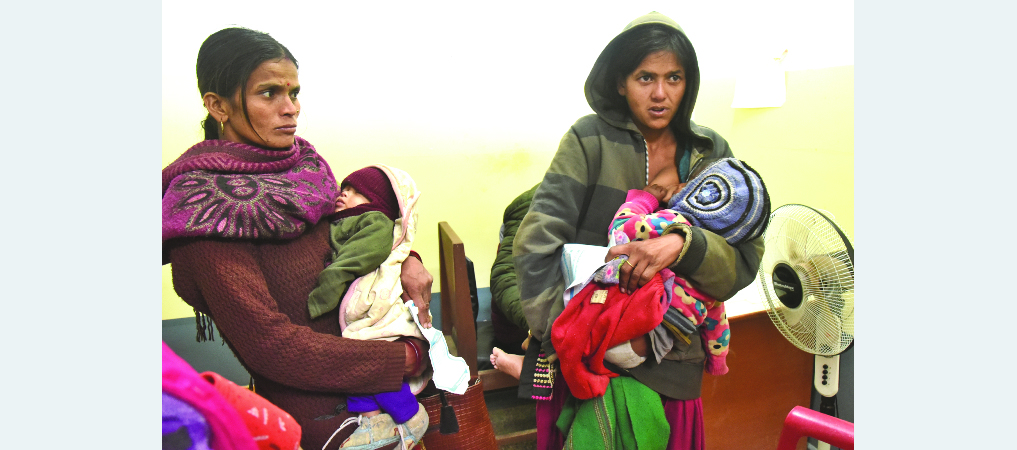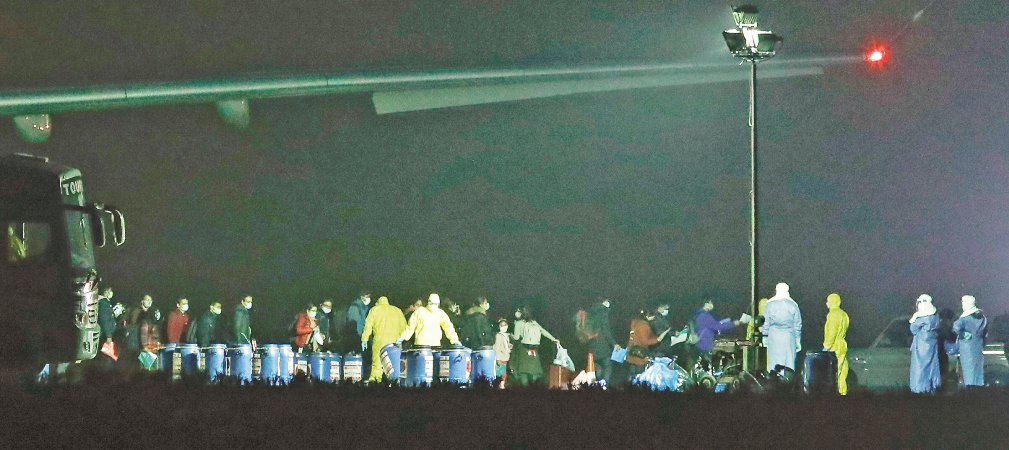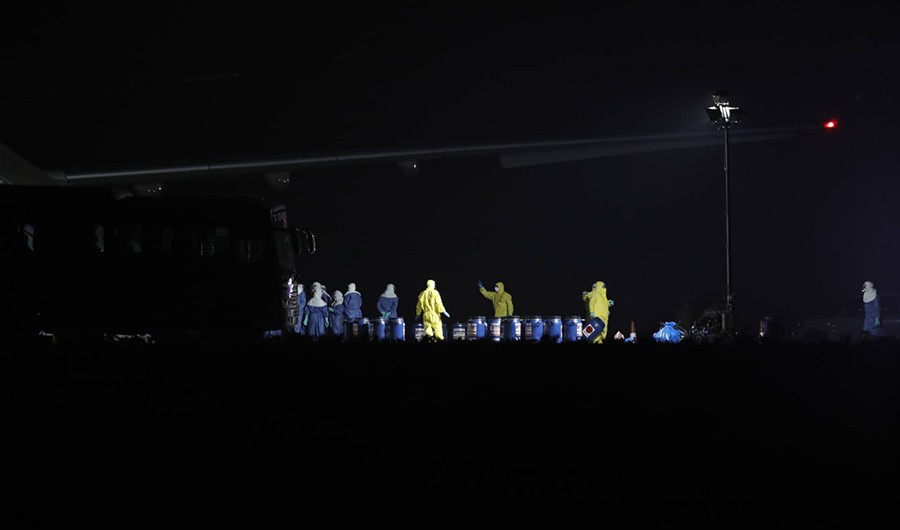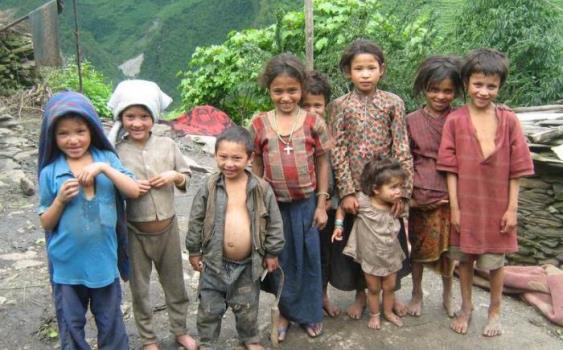Nepal in desperate need of life-saving vaccines
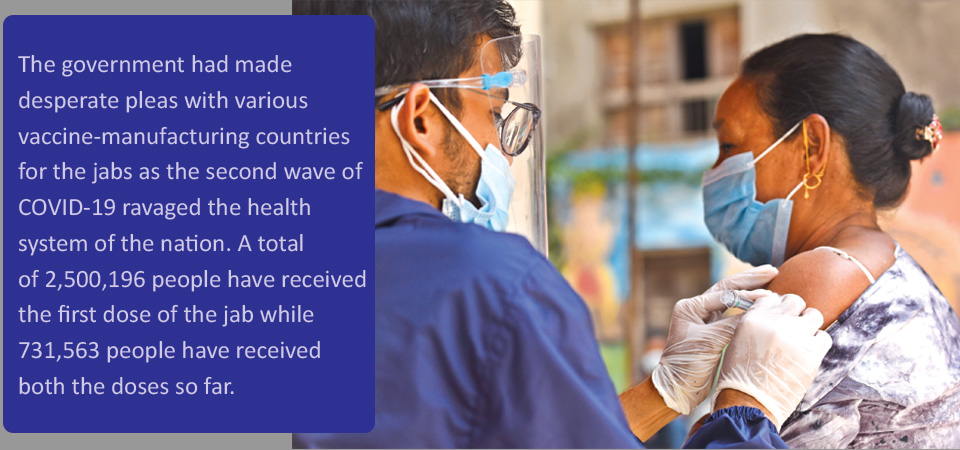
By Ajita Rijal
Kathmandu, June 27: Nepal is witnessing a decline in COVID-19 infection in the recent days, after the worst second wave of infections over the past months. With some respite in the caseload, the government has continued to reach out and Nepal now is in desperate need of vaccines. The government had made desperate pleas with various vaccine-manufacturing countries for the jabs as the second wave of COVID-19 ravaged the health system of the nation.
The government was able to vaccinate about 8.3 per cent of the population. Among them, 2.4 per cent have received both the doses and are fully vaccinated so far.
According to Dr. Jhalak Gautam, Chief of the National Immunisation Programme under the Ministry of Health and Population (MoHP), a total of 2,500,196 people have received the first dose of the jab while 731,563 people have received both the doses so far.
“An utmost effort from various mechanisms is under way to bring the vaccines,” said Dr. Gautam. The government is committed to vaccinate all the eligible people free of cost and it has been exploring all possible ways to procure vaccines at the earliest, he added.
Among the people vaccinated with the first dose, around 1.4 million elderly citizens are eagerly waiting for the second dose of the vaccines. With the unavailability of vaccines, the government has not been able to inoculate them, which is necessary as a booster for better efficacy.
The government had frequently made appeals to India to at least send the remaining 1 million Covishield jabs Nepal had paid for, and to Britain to supply vaccines so that elderly citizens could get the booster doses who are now waiting for more than 12 weeks.
As per the vaccination plan, those 1.4 million elderly people were supposed to get the second dose of vaccine at the interval of 8-12 weeks, which was due last month May 16 to May 29.
Health experts said they had been frustrated as they have no answer to people desperately waiting for the vaccines. “Not only elderly people who are waiting for the second dose, but also other people who have not received any dose have been asking about the vaccines,” they said.
Dr. Rabindra Pandey, a public health expert, said that as the second wave of COVID-19 was more fatal than the first wave, people who have taken double shots have not fallen ill seriously from the virus.
Even deaths were not recorded among the people who received both doses of the vaccine, said Dr. Pandey and emphasised on the need to ensure availability of vaccines at the earliest.
Second dose important, but no need to panic
As the country faces supply shortages of vaccines, those waiting for the second dose may have to keep waiting, but health experts say there is no need to panic.
According to Dr. Shyam Raj Upreti, Coordinator of the COVID-19 Vaccine Advisory Committee, when people take the first dose of any COVID-19 vaccine, it activates an immune response, which works even if you delay your booster dose.
Dr. Upreti said that the main concern in delays of the second dose may weaken immune response and one must get the second dose as soon as the vaccine becomes available.
He said that as the new strain of the virus is emerging time and again getting both doses is more important and safer.
Only one of vaccine may not work at the optimum level, that is why people need the second dose, according to doctors.
In case of Covishield vaccine, the minimum gap between two doses is mentioned as 12 weeks but a longer gap could increase the results. Therefore, everyone must get his or her second dose of COVID-19 vaccine even if it is delayed.
The unavailability of vaccines has sparked a wave of fear among the people, who got their first dose, but there is nothing to panic, said Dr. Uprety and urged everyone to focus on getting their second dose as per the government schedule after availability of the vaccines.
Status of vaccination campaign
Nepal launched its vaccination campaign against COVID-19 on January 27 with the 1 million doses India had provided under its Vaccine Maitri programme.
Around 430,000 frontline workers – health workers, staffs at health facilities, female community health volunteers, security personnel, sanitation workers – were listed as priority groups for the first round of the vaccination campaign.
After the first round’s first phase was completed, the government announced to vaccinate journalists and diplomatic staff. When the first phase was completed on March 5, as many as 438,000 people had
received their first doses of COVID vaccines.
In February, the government decided to buy 2 million doses of vaccines from the Serum Institute of India, at $4 per dose. The first consignment was delivered immediately, as 1 million doses arrived on February 21 but the second consignment has not arrived yet.
Also, 348,000 doses of Covishield arrived in Nepal on February 21 under the World Health Organisation (WHO)’s COVAX facility. With the arrival of vaccines continuously, there were high hopes and the public responded hearteningly. Then the government inoculated 1.4 million senior citizens in the second phase of the vaccination campaign.
After Nepal granted emergency use approval to Vero Cell vaccine of Sinopharm on February 15, Chinese government then provided 800,000 doses of the vaccine under the grant assistance. The Vero Cell arrived in Kathmandu on March 29.
After the arrival of the Chinese vaccine, the government resumed vaccination campaign from April 7.
Vero Cell was then administered to people working in postal and telephone services, public transportation services, water supply and distribution, tourism sector—hotels and restaurants—production, sales and distribution of medicines, electricity supply, storage and transportation of consumer goods as well as health workers who had missed the first phase of the vaccination drive earlier from January 27. The government provided second dose of Vero Cell from May 16 to May 25.
The country resumed its stalled COVID-19 vaccination campaign on June 8 with 1 million doses given by China after the government made international pleas for help with a shortage of shots.
Then the government decided to inoculate people aged 61-64. Having insufficient amount of vaccines, some of the local levels provided jabs to people aged 62- 64 years of age.
Now, the Ministry of Health and Population (MoHP) has announced to provide second dose of Vero Cell from July 6. As per COVAX commitment, 1.9 million doses were to arrive in Nepal by March. However, as per the latest update made by the COVAX, additional 348,000 could come by July.
Recent News

Do not make expressions casting dout on election: EC
14 Apr, 2022
CM Bhatta says may New Year 2079 BS inspire positive thinking
14 Apr, 2022
Three new cases, 44 recoveries in 24 hours
14 Apr, 2022
689 climbers of 84 teams so far acquire permits for climbing various peaks this spring season
14 Apr, 2022
How the rising cost of living crisis is impacting Nepal
14 Apr, 2022
US military confirms an interstellar meteor collided with Earth
14 Apr, 2022
Valneva Covid vaccine approved for use in UK
14 Apr, 2022
Chair Prachanda highlights need of unity among Maoist, Communist forces
14 Apr, 2022
Ranbir Kapoor and Alia Bhatt: Bollywood toasts star couple on wedding
14 Apr, 2022
President Bhandari confers decorations (Photo Feature)
14 Apr, 2022



